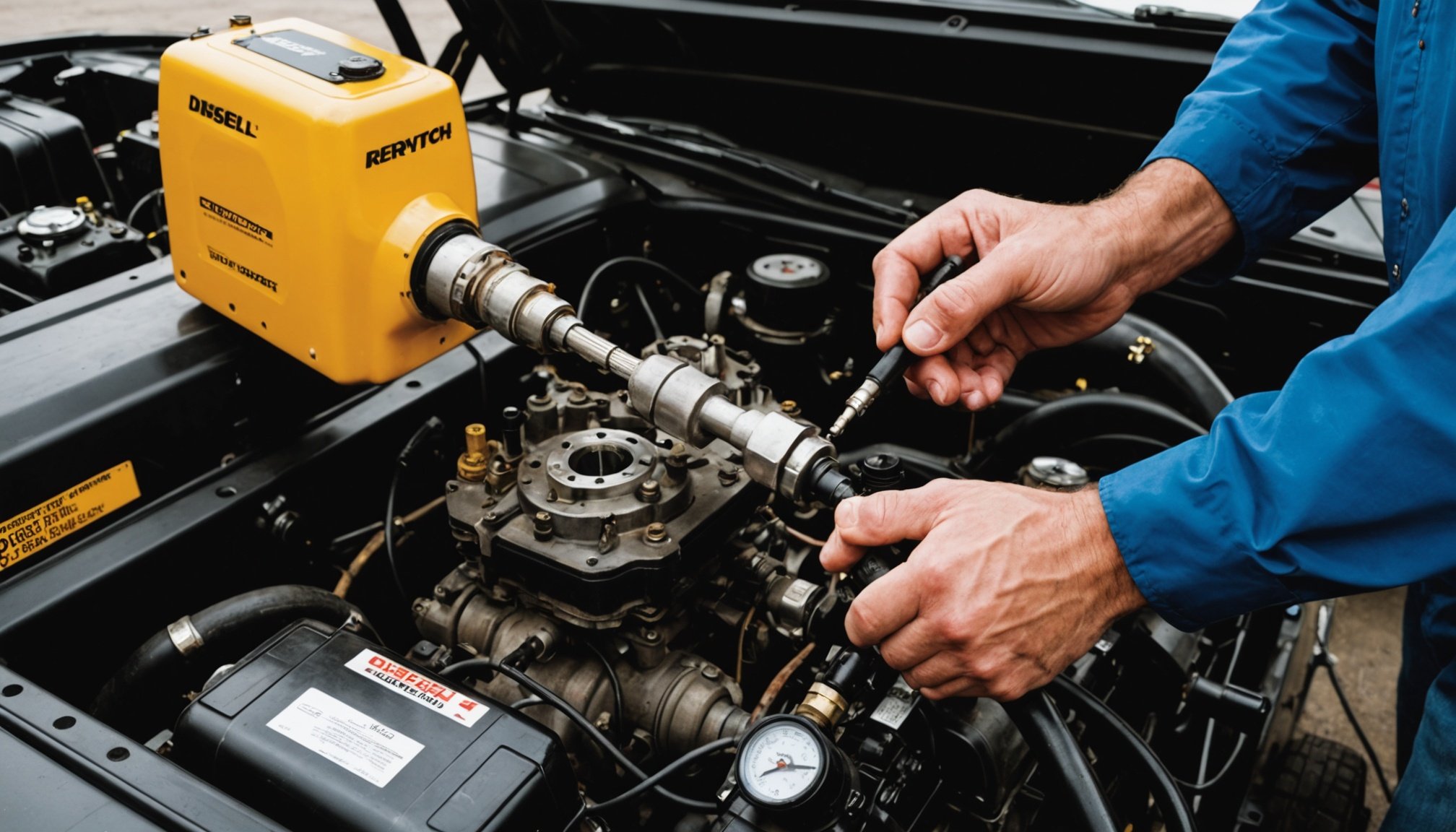Understanding Diesel Fuel Injection Systems
Delving into diesel fuel injection systems reveals a world of engineering precision, pivotal for vehicles and machinery reliant on diesel engines. A diesel fuel injection system ensures efficient fuel delivery to the engine cylinders, significantly impacting the engine’s performance, fuel consumption, and emissions.
Key Components and Their Functions
A fundamental understanding begins with the major components of these systems:
In parallel : Crucial safety guidelines for seamlessly installing a gps tracking system in your vehicle
- Fuel Injectors: Act as the gateway for fuel, atomising and injecting it into the combustion chamber with precise timing.
- Fuel Pump: Generates the necessary pressure to transport fuel from the tank to the injectors.
- Filters: Protect from impurities that could damage engine components.
- Control Unit: The brain, orchestrating the timing and amount of fuel based on various engine parameters.
Types of Diesel Fuel Injection Systems
Common systems include:
- Common Rail: Offers high-pressure, electronically controlled injectors for enhanced efficiency and lower emissions.
- Unit Injector: Combines pump and injector functions at each cylinder, ensuring precise control.
- Distributor Pump: A simpler system found in older engines, distributing fuel via a rotary mechanism.
Mastering these systems allows for better engine performance, reduced maintenance issues, and optimal fuel efficiency.
Have you seen this : Crucial safety guidelines for inspecting electrical systems in hybrid cars
Inspection Strategies for Diesel Fuel Injection
Understanding and applying proper diesel fuel injection inspection procedures is essential for maintaining the integrity and functionality of diesel engines. This section explores essential tools required, step-by-step procedures, and common issues to identify during inspections.
Essential Tools Required for Inspection
To conduct a successful diesel fuel injection inspection, technicians must equip themselves with essential tools. These include:
- Pressure Gauges: Vital for checking fuel pressure levels.
- Diagnostic Scanners: Utilised to read error codes and assess electronic components.
- Noid Lights: Essential for investigating electrical outputs from the control unit.
Step-by-Step Inspection Procedures
Begin with a preliminary system check to ensure all components appear intact. Follow by testing fuel pressure using gauges, ensuring levels align with manufacturer specifications. Employ diagnostic scanners next, analysing error codes to pinpoint potential electronic malfunctions.
Common Issues to Identify
During a thorough inspection, look for signs of fuel leakage, which can indicate worn injectors or seals. Carbon build-up is another common issue, often resulting from inefficient combustion processes. Inadequate pressure levels suggest faults in the pump or injector components. Address these promptly to prevent further complications.
Routine inspections using these strategies enhance diesel engine performance and longevity.
Maintenance Techniques for Diesel Fuel Injection
Proper diesel fuel injection maintenance is crucial to ensuring optimal engine performance and longevity. Establishing a rigorous maintenance schedule forms the backbone of any effective maintenance strategy. It’s essential to integrate preventive maintenance techniques, such as routine checks on fuel injectors and pumps for early signs of wear or clogging.
Scheduled maintenance should be adhered to diligently, with intervals recommended by the manufacturer—typically every 15,000 to 20,000 miles. Regularly replacing filters can prevent impurities from damaging the system, a vital part of maintaining fuel injector efficiency and engine health.
Detailed techniques include ultrasonic cleaning of injectors, which helps remove carbon deposits without disassembly. For those seeking to extend the lifespan of the system, using fuel additives periodically can enhance cleaning and improve injector performance. Remember, these practices not only boost efficiency but also reduce emissions and fuel consumption.
Additionally, sophisticated diagnostic tools can aid in early detection of potential issues, making repairs more manageable and less costly. Following these maintenance techniques ensures that your diesel fuel injection systems continue to operate smoothly and efficiently for the long term.
Troubleshooting Common Diesel Fuel Injection Problems
Navigating diesel fuel injection troubleshooting requires a comprehensive understanding of common problems and effective solutions. Trouble often arises from issues like hard starting, erratic idling, and excessive smoke emissions. These difficulties typically stem from component wear, incorrect fuel delivery, or contaminated fuel, impacting system performance.
Diagnostic Methods to Identify Issues
For precise issue identification, utilise diagnostic scanners to retrieve error codes. This step, combined with manual inspection, reveals faults in electronic controls or mechanical components. Ensuring accurate diagnosis prevents unnecessary repairs, optimising time and resource use.
Step-by-Step Solutions for Troubleshooting
- Assess Fuel Quality: Check for contamination or degradation impacting performance.
- Inspect Filters and Lines: Verify they are clear of obstructions and in good condition.
- Test Injector Functionality: Use pressure gauges to confirm correct fuel delivery pressure.
- Examine Control Unit Outputs: Ensure signals are correctly regulating the injection process.
Each method targets specific problem areas, facilitating effective resolution and system restoration. By diligently applying these troubleshooting strategies, diesel fuel injection systems can be maintained at peak operational efficiency, reducing downtime and repair costs. Embrace detailed system checks and problem-solving techniques for optimal performance.
Tools and Equipment for Diesel Fuel Injection
In the realm of diesel fuel injection maintenance, possessing the right tools and equipment is paramount. These tools not only streamline the maintenance process but also ensure precision in addressing any system anomalies.
Essential Tools for Diesel Fuel Injection Maintenance
-
Digital Pressure Gauges: Vital for accurately measuring fuel pressure to maintain optimal injector function. They provide real-time data, helping technicians evaluate system performance efficiently.
-
Diagnostic Scanners: These analyse electronic components by reading error codes, which helps identify faults promptly. Advanced models allow for bidirectional testing, giving more control during diagnostics.
Equipment Recommendations and Their Uses
Invest in ultrasonic cleaning machines; they are invaluable for removing carbon deposits from injectors without the need for disassembly, promoting system longevity through thorough cleansing. Additionally, fuel injectors testers help simulate injector performance, ensuring that injector spray patterns and pressures are within specification.
Cost-Effective Tool Options for Technicians
Budget-conscious technicians can opt for multi-functional toolkits that include basic diagnostic devices and manual pressure testers. While these may lack some features of advanced tools, they still provide adequate utility for basic troubleshooting and maintenance tasks. Selecting the right tool lineup facilitates effective maintenance, bolstering diesel injector performance and lifespan.
Expert Tips for Diesel Fuel Injection
Unveiling finesse in handling diesel fuel injection systems often involves expertise gleaned from seasoned mechanics. Their technical insights are invaluable for mastering inspection and maintenance.
Tips from Experienced Diesel Mechanics
-
Regular System Checks: Incorporate regular system diagnostics as a part of the routine to preempt troubles. Experienced operators know early detection curtails costly repairs later.
-
Use Quality Components: Opt for high-grade parts and consumables to ensure longevity and reliable performance. Investing in quality is a proactive safeguard against premature failures.
Insights into Best Practices for Inspection and Maintenance
Mechanics emphasize that attention to detail in maintenance prevents common pitfalls. For instance, timely replacements of wear parts like filters can significantly enhance system efficiency. Deploy advanced diagnostic tools for precise error assessments.
Importance of Continuous Education and Training in the Field
Staying updated with continuous education is pivotal as diesel technologies evolve rapidly. Engaging in regular training workshops keeps mechanics abreast of the latest advancements, thus enhancing diagnostic accuracy and performance optimization techniques. By adopting these expert tips, diesel fuel injection systems can function at their best, ensuring optimal engine longevity and efficiency.









